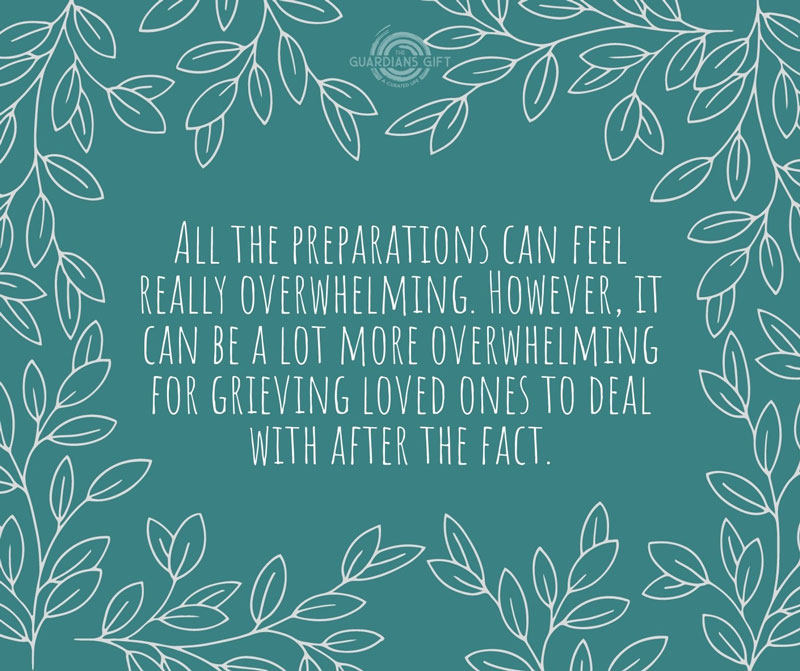So, you want to talk about death and dying … of course you don’t. Nobody really wants to talk about death and dying and nobody really does until they absolutely have to. Death is a topic that feels dark and even taboo. Death feels like a topic we shouldn’t be thinking about, and especially not talking about. It’s not typically a topic you bring up while casually grabbing coffee or a drink with a friend. If you did, you’d probably make your friend very uncomfortable and maybe even a little concerned about you.
Oddly enough, I’m somebody who’s interested in discussing this topic. I’m guessing maybe you are too if you were drawn to this post. The truth is death is a topic we SHOULD be discussing. Of course, most people don’t want to die, but it is a fact of life. This is going to sound morbid, but just stick with me. Imagine you died tomorrow. Would any of your loved ones know what your wishes are? Do you want to be buried or cremated? How do you want your funeral to be? Do you even want a traditional funeral? These questions merely scratch the surface of all the post death plans there are to think about. Maybe you haven’t even considered it any of this for yourself. I get it, it’s a lot to think about. All the preparations can feel really overwhelming. However, it can be a lot more overwhelming for grieving loved ones to deal with after the fact. After a death, close family members are left with many responsibilities such as preparing for the funeral, handling finances, dealing with legal matter, etc. All of these things on top of processing grief are difficult enough. Dealing with these matters without any sense of direction sounds even harder though.
An article from Co-Op Media found that nearly 18 million people admitted being uncomfortable about discussing death. This statistic comes from a survey taken in the UK. What’s interesting is that I could not even find statistics on this topic for the US, and maybe that’s reflective of a bigger problem. People clearly don’t want to talk about it, so much so, that we can’t even collect significant data about discussing death. By avoiding the topic of death and dying, we are doing ourselves and our loved ones a disservice. By not talking about it, we miss the opportunity to not only be prepared for the inevitable, but maybe we miss an opportunity for deeper connection. As someone who has had some experience surrounding the topic, allow me to encourage you as to why we should be bringing it up.
1. Opportunity for deeper connection
As we’ve addressed, death can be an uncomfortable thing to talk about. It doesn’t have to be awkward though if we don’t make it. Odds are if you’re thinking about bringing it up with a loved one, they’re probably already thinking about it too. By initiating the conversation, you’ve created an opportunity. How you bring the topic up is completely up to you. Maybe it’ll arise naturally. Maybe you can bring it up with humor. Or maybe it’ll feel a little abrupt, but you’ll bring it up anyways because it’s something you’ve been thinking about. Once you’ve opened the door though, then you have a chance to talk about preferences, fears, regrets, and memories. While not all of this might be happy and lighthearted, it’s given both you and your loved one an opportunity to speak their mind. Recently my dad and I got on the topic of death and what’s out there afterwards. That could be a whole other blog post in itself. However, the point is that we were able to talk a little about both of our doubts and fears as well as faith and afterlife. I felt like I understood my dad a lot better after that conversation and I even learned some more about why he’s hesitant to talk about death himself. Since death can be a deeply emotional and personal topic, by initiating a conversation about it, we have the potential to connect on a deeper and much more intimate level with our loved ones.
2. To be prepared and the power of decision
Talking about death is a great start to figuring out what you or your loved one wants your end of life to look like. While we don’t specifically have control of our own death, we do have control over some of the things surrounding it. We are able to decide what kind of end of life care we think we’ll want. We can decide who to designate our money or possessions to. We can decide what we want to be done with our bodies after death. We can also choose seemingly simple things like what kind of music or flowers we’d prefer at our funeral. There is power in decision, and if we have the opportunity to choose these things before we leave this earth, why shouldn’t we? Many of the things I’ve just named fall into what’s called “Advance care planning”. Simply put, this just means planning ahead for end of life. A study on end-of-life care in elderly patients found that “advance care planning improves end of life care and patient and family satisfaction and reduces stress, anxiety, and depression in surviving relatives” (pubmed.gov). Avoiding stress and potential family conflict down the road sure sounds like a good reason to bring up death sooner rather than later to me.
3. To bring some peace to yourself and your loved one
Thinking about death can bring up intense feelings of fear for many individuals. Due to the ongoing pandemic and the time that we find ourselves in, fear over death has arguably been heightened. Something that many of us didn’t think about before has suddenly been brought to the forefront of our minds. If you’ve lost a loved one due to covid-19, I truly am so sorry for your loss. Whether you’ve been personally impacted by the pandemic or not, odds are the 500,000+ American lives lost (cdc.org) have at least caused you to pause and consider how unexpectedly we can be faced with death. It’s become abundantly clear how anxiety provoking death can be. This is even more reason for us to begin discussing it. By discussing it, we can alleviate some of the stress and anxiety surrounding dying. By discussing our fears, the unknown, our deepest wants, our plans, we can have peace. We can have peace knowing that we’ve talked about it. We don’t have to worry about if we’ll have the kind of funeral we wanted because we’ve talked about it. We don’t have to worry about if our affairs are in order because we’ve already talked about it. When we’re prepared, we can have peace. Peace is available to all of us and often times the first step is to talk about it.
Conclusion:
A lot of the things written in this blog post may have been uncomfortable or overwhelming to read. Confronting difficult topics such as death can feel that way at first. If anything, I hope this blog was encouraging and motivating to you. I hope it made you want to change the way we talk think and talk about death in our society. If you take anything away from this, I want you to take away that it’s never too early to start discussing death with your loved ones. Would it shock you to know that the writer of this post is only 23 years old? Yep, that’s right. A 23-year-old is on the internet talking to you about being prepared for your death. Maybe you won’t take it as far as writing to strangers about death on the internet, but I definitely encourage you to start thinking about it yourself. Start bringing the topic up to your family members and loved ones. Let’s be a part of taking away the taboo. Death is as natural as birth. It is inevitable after all. So, we really should start talking about it. Go ahead, bring up your living will or burial preferences over coffee. I dare you.
Until next time,
Logan 🙂






